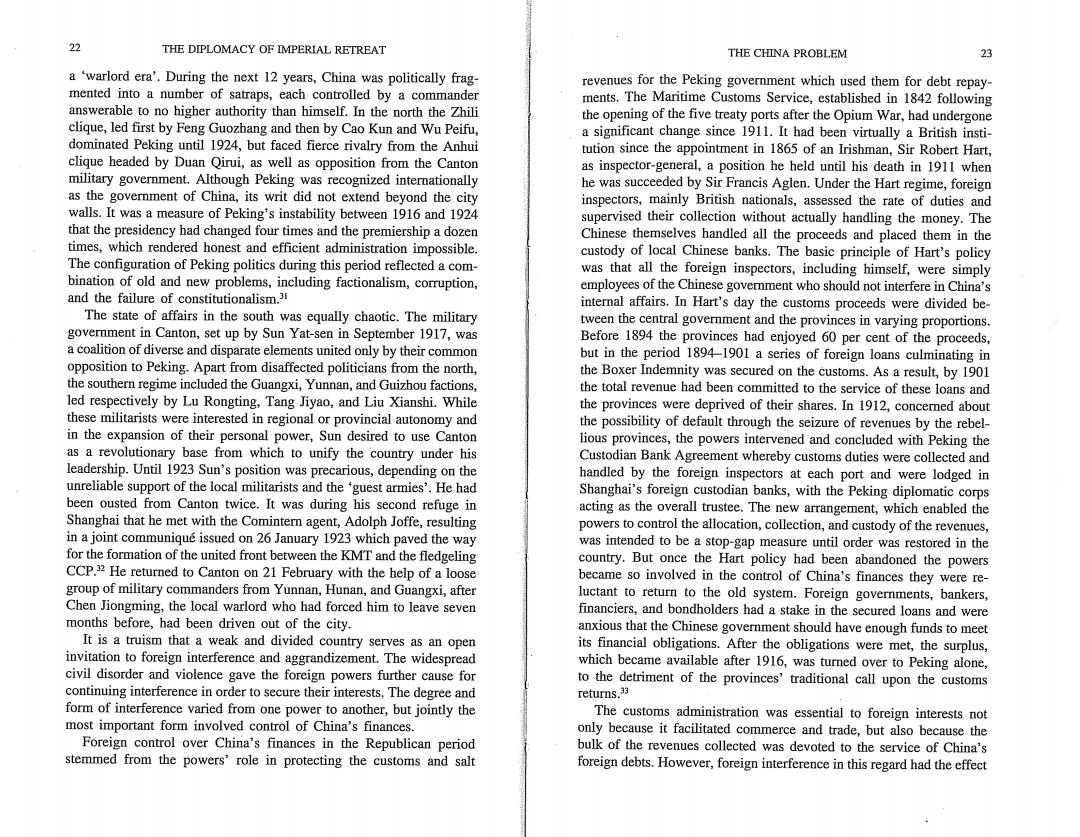
22 THE DIPLOMACY OF IMPERIAL RETREAT THE CHINA PROBLEM 23 a 'warlord era'.During the next 12 years,China was politically frag- revenues for the Peking government which used them for debt repay- mented into a number of satraps,each controlled by a commander ments.The Maritime Customs Service,established in 1842 following answerable to no higher authority than himself.In the north the Zhili the opening of the five treaty ports after the Opium War,had undergone clique,led first by Feng Guozhang and then by Cao Kun and Wu Peifu, a significant change since 1911.It had been virtually a British insti- dominated Peking until 1924,but faced fierce rivalry from the Anhui tution since the appointment in 1865 of an Irishman,Sir Robert Hart, clique headed by Duan Qirui,as well as opposition from the Canton as inspector-general,a position he held until his death in 1911 when military government.Although Peking was recognized internationally he was succeeded by Sir Francis Aglen.Under the Hart regime,foreign as the government of China,its writ did not extend beyond the city inspectors,mainly British nationals,assessed the rate of duties and walls.It was a measure of Peking's instability between 1916 and 1924 supervised their collection without actually handling the money.The that the presidency had changed four times and the premiership a dozen Chinese themselves handled all the proceeds and placed them in the times,which rendered honest and efficient administration impossible. custody of local Chinese banks.The basic principle of Hart's policy The configuration of Peking politics during this period reflected a com- was that all the foreign inspectors,including himself,were simply bination of old and new problems,including factionalism,corruption, employees of the Chinese government who should not interfere in China's and the failure of constitutionalism.3 internal affairs.In Hart's day the customs proceeds were divided be- The state of affairs in the south was equally chaotic.The military tween the central government and the provinces in varying proportions. government in Canton,set up by Sun Yat-sen in September 1917,was Before 1894 the provinces had enjoyed 60 per cent of the proceeds, a coalition of diverse and disparate elements united only by their common but in the period 1894-1901 a series of foreign loans culminating in opposition to Peking.Apart from disaffected politicians from the north, the Boxer Indemnity was secured on the customs.As a result,by 1901 the southern regime included the Guangxi,Yunnan,and Guizhou factions, the total revenue had been committed to the service of these loans and led respectively by Lu Rongting,Tang Jiyao,and Liu Xianshi.While the provinces were deprived of their shares.In 1912,concerned about these militarists were interested in regional or provincial autonomy and the possibility of default through the seizure of revenues by the rebel- in the expansion of their personal power,Sun desired to use Canton lious provinces,the powers intervened and concluded with Peking the as a revolutionary base from which to unify the country under his Custodian Bank Agreement whereby customs duties were collected and leadership.Until 1923 Sun's position was precarious,depending on the handled by the foreign inspectors at each port and were lodged in unreliable support of the local militarists and the guest armies'.He had Shanghai's foreign custodian banks,with the Peking diplomatic corps been ousted from Canton twice.It was during his second refuge in acting as the overall trustee.The new arrangement,which enabled the Shanghai that he met with the Comintern agent,Adolph Joffe,resulting powers to control the allocation,collection,and custody of the revenues, in a joint communique issued on 26 January 1923 which paved the way was intended to be a stop-gap measure until order was restored in the for the formation of the united front between the KMT and the fledgeling country.But once the Hart policy had been abandoned the powers CCP.32 He returned to Canton on 21 February with the help of a loose became so involved in the control of China's finances they were re- group of military commanders from Yunnan,Hunan,and Guangxi,after luctant to return to the old system.Foreign governments,bankers, Chen Jiongming,the local warlord who had forced him to leave seven financiers,and bondholders had a stake in the secured loans and were months before,had been driven out of the city. anxious that the Chinese government should have enough funds to meet It is a truism that a weak and divided country serves as an open its financial obligations.After the obligations were met,the surplus, invitation to foreign interference and aggrandizement.The widespread which became available after 1916,was turned over to Peking alone, civil disorder and violence gave the foreign powers further cause for to the detriment of the provinces'traditional call upon the customs continuing interference in order to secure their interests.The degree and returns.33 form of interference varied from one power to another,but jointly the The customs administration was essential to foreign interests not most important form involved control of China's finances. only because it facilitated commerce and trade,but also because the Foreign control over China's finances in the Republican period bulk of the revenues collected was devoted to the service of China's stemmed from the powers'role in protecting the customs and salt foreign debts.However,foreign interference in this regard had the effect
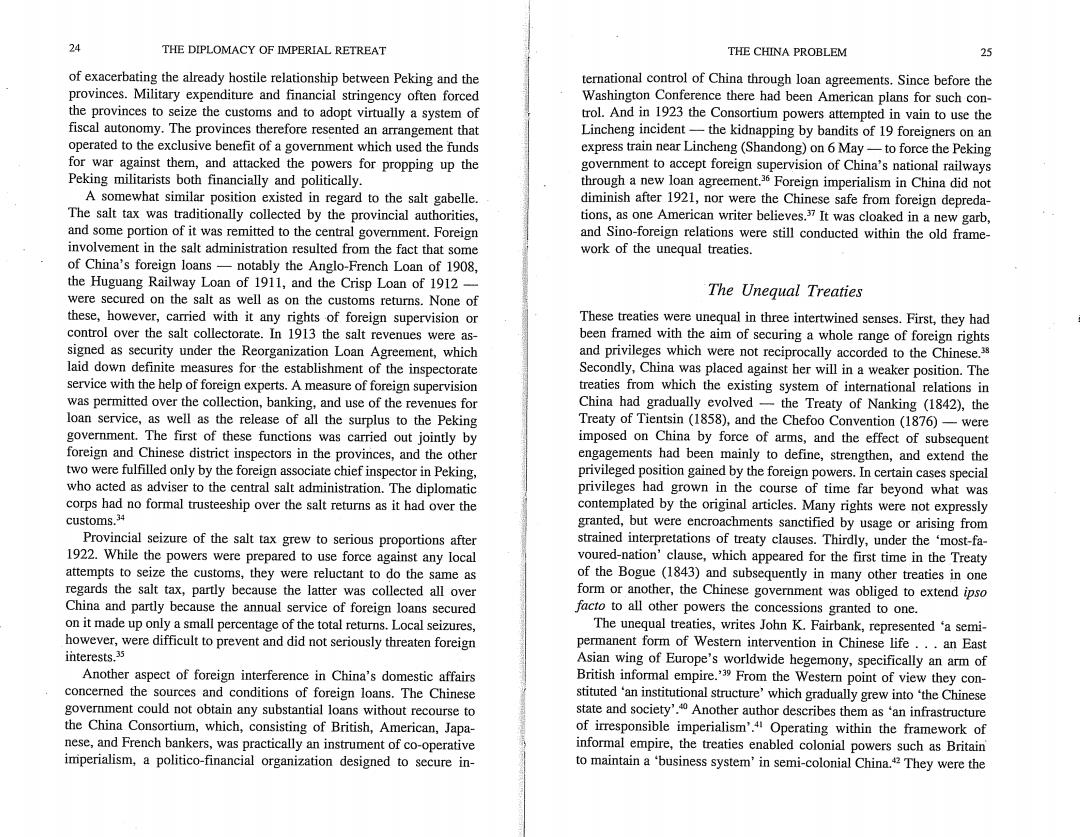
24 THE DIPLOMACY OF IMPERIAL RETREAT THE CHINA PROBLEM 25 of exacerbating the already hostile relationship between Peking and the ternational control of China through loan agreements.Since before the provinces.Military expenditure and financial stringency often forced Washington Conference there had been American plans for such con- the provinces to seize the customs and to adopt virtually a system of trol.And in 1923 the Consortium powers attempted in vain to use the fiscal autonomy.The provinces therefore resented an arrangement that Lincheng incident-the kidnapping by bandits of 19 foreigners on an operated to the exclusive benefit of a government which used the funds express train near Lincheng (Shandong)on 6 May-to force the Peking for war against them,and attacked the powers for propping up the government to accept foreign supervision of China's national railways Peking militarists both financially and politically. through a new loan agreement.36 Foreign imperialism in China did not A somewhat similar position existed in regard to the salt gabelle. diminish after 1921,nor were the Chinese safe from foreign depreda- The salt tax was traditionally collected by the provincial authorities, tions,as one American writer believes.37 It was cloaked in a new garb, and some portion of it was remitted to the central government.Foreign and Sino-foreign relations were still conducted within the old frame- involvement in the salt administration resulted from the fact that some work of the unequal treaties. of China's foreign loans-notably the Anglo-French Loan of 1908, the Huguang Railway Loan of 1911,and the Crisp Loan of 1912- were secured on the salt as well as on the customs returns.None of The Unequal Treaties these,however,carried with it any rights of foreign supervision or These treaties were unequal in three intertwined senses.First,they had control over the salt collectorate.In 1913 the salt revenues were as- been framed with the aim of securing a whole range of foreign rights signed as security under the Reorganization Loan Agreement,which and privileges which were not reciprocally accorded to the Chinese. laid down definite measures for the establishment of the inspectorate Secondly,China was placed against her will in a weaker position.The service with the help of foreign experts.A measure of foreign supervision treaties from which the existing system of international relations in was permitted over the collection,banking,and use of the revenues for China had gradually evolved-the Treaty of Nanking (1842),the loan service,as well as the release of all the surplus to the Peking Treaty of Tientsin (1858),and the Chefoo Convention (1876)-were government.The first of these functions was carried out jointly by imposed on China by force of arms,and the effect of subsequent foreign and Chinese district inspectors in the provinces,and the other engagements had been mainly to define,strengthen,and extend the two were fulfilled only by the foreign associate chief inspector in Peking, privileged position gained by the foreign powers.In certain cases special who acted as adviser to the central salt administration.The diplomatic privileges had grown in the course of time far beyond what was corps had no formal trusteeship over the salt returns as it had over the contemplated by the original articles.Many rights were not expressly customs.34 granted,but were encroachments sanctified by usage or arising from Provincial seizure of the salt tax grew to serious proportions after strained interpretations of treaty clauses.Thirdly,under the 'most-fa- 1922.While the powers were prepared to use force against any local voured-nation'clause,which appeared for the first time in the Treaty attempts to seize the customs,they were reluctant to do the same as of the Bogue (1843)and subsequently in many other treaties in one regards the salt tax,partly because the latter was collected all over form or another,the Chinese government was obliged to extend ipso China and partly because the annual service of foreign loans secured facto to all other powers the concessions granted to one. on it made up only a small percentage of the total returns.Local seizures, The unequal treaties,writes John K.Fairbank,represented 'a semi- however,were difficult to prevent and did not seriously threaten foreign permanent form of Western intervention in Chinese life...an East interests.35 Asian wing of Europe's worldwide hegemony,specifically an arm of Another aspect of foreign interference in China's domestic affairs British informal empire.'39 From the Western point of view they con- concerned the sources and conditions of foreign loans.The Chinese stituted 'an institutional structure'which gradually grew into 'the Chinese government could not obtain any substantial loans without recourse to state and society'.40 Another author describes them as 'an infrastructure the China Consortium,which,consisting of British,American,Japa- of irresponsible imperialism'.4 Operating within the framework of nese,and French bankers,was practically an instrument of co-operative informal empire,the treaties enabled colonial powers such as Britain imperialism,a politico-financial organization designed to secure in- to maintain a 'business system'in semi-colonial China.They were the
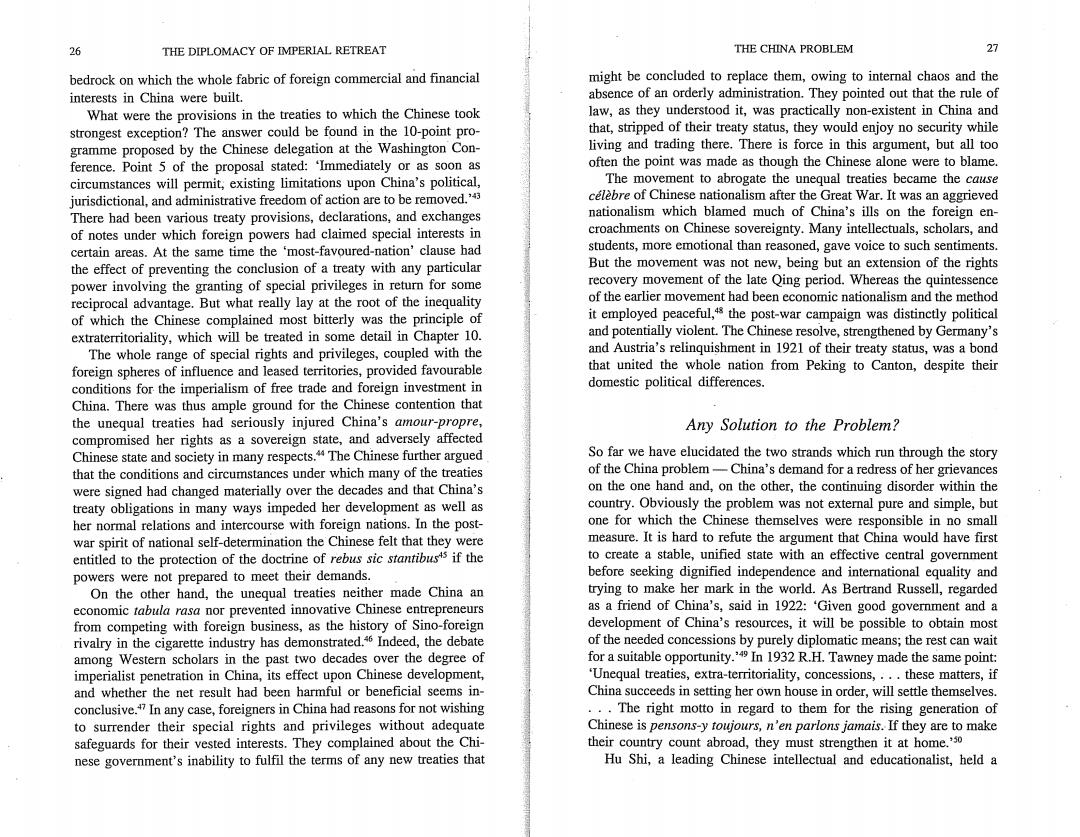
26 THE DIPLOMACY OF IMPERIAL RETREAT THE CHINA PROBLEM 27 bedrock on which the whole fabric of foreign commercial and financial might be concluded to replace them,owing to internal chaos and the interests in China were built. absence of an orderly administration.They pointed out that the rule of What were the provisions in the treaties to which the Chinese took law,as they understood it,was practically non-existent in China and strongest exception?The answer could be found in the 10-point pro- that,stripped of their treaty status,they would enjoy no security while gramme proposed by the Chinese delegation at the Washington Con- living and trading there.There is force in this argument,but all too ference.Point 5 of the proposal stated:'Immediately or as soon as often the point was made as though the Chinese alone were to blame. circumstances will permit,existing limitations upon China's political, The movement to abrogate the unequal treaties became the cause jurisdictional,and administrative freedom of action are to be removed.'4 celebre of Chinese nationalism after the Great War.It was an aggrieved There had been various treaty provisions,declarations,and exchanges nationalism which blamed much of China's ills on the foreign en- of notes under which foreign powers had claimed special interests in croachments on Chinese sovereignty.Many intellectuals,scholars,and certain areas.At the same time the 'most-favoured-nation'clause had students,more emotional than reasoned,gave voice to such sentiments. the effect of preventing the conclusion of a treaty with any particular But the movement was not new,being but an extension of the rights power involving the granting of special privileges in return for some recovery movement of the late Qing period.Whereas the quintessence reciprocal advantage.But what really lay at the root of the inequality of the earlier movement had been economic nationalism and the method of which the Chinese complained most bitterly was the principle of it employed peaceful,s the post-war campaign was distinctly political extraterritoriality,which will be treated in some detail in Chapter 10. and potentially violent.The Chinese resolve,strengthened by Germany's The whole range of special rights and privileges,coupled with the and Austria's relinquishment in 1921 of their treaty status,was a bond foreign spheres of influence and leased territories,provided favourable that united the whole nation from Peking to Canton,despite their conditions for the imperialism of free trade and foreign investment in domestic political differences. China.There was thus ample ground for the Chinese contention that the unequal treaties had seriously injured China's amour-propre, Any Solution to the Problem? compromised her rights as a sovereign state,and adversely affected Chinese state and society in many respects.The Chinese further argued So far we have elucidated the two strands which run through the story that the conditions and circumstances under which many of the treaties of the China problem-China's demand for a redress of her grievances were signed had changed materially over the decades and that China's on the one hand and,on the other,the continuing disorder within the treaty obligations in many ways impeded her development as well as country.Obviously the problem was not external pure and simple,but her normal relations and intercourse with foreign nations.In the post- one for which the Chinese themselves were responsible in no small war spirit of national self-determination the Chinese felt that they were measure.It is hard to refute the argument that China would have first entitled to the protection of the doctrine of rebus sic stantibusis if the to create a stable,unified state with an effective central government powers were not prepared to meet their demands. before seeking dignified independence and international equality and On the other hand,the unequal treaties neither made China an trying to make her mark in the world.As Bertrand Russell,regarded economic tabula rasa nor prevented innovative Chinese entrepreneurs as a friend of China's,said in 1922:'Given good government and a from competing with foreign business,as the history of Sino-foreign development of China's resources,it will be possible to obtain most rivalry in the cigarette industry has demonstrated.6 Indeed,the debate of the needed concessions by purely diplomatic means;the rest can wait among Western scholars in the past two decades over the degree of for a suitable opportunity.49 In 1932 R.H.Tawney made the same point: imperialist penetration in China,its effect upon Chinese development, 'Unequal treaties,extra-territoriality,concessions,...these matters,if and whether the net result had been harmful or beneficial seems in- China succeeds in setting her own house in order,will settle themselves. conclusive.7 In any case,foreigners in China had reasons for not wishing ..The right motto in regard to them for the rising generation of to surrender their special rights and privileges without adequate Chinese is pensons-y toujours,n'en parlons jamais.If they are to make safeguards for their vested interests.They complained about the Chi- their country count abroad,they must strengthen it at home.'30 nese government's inability to fulfil the terms of any new treaties that Hu Shi,a leading Chinese intellectual and educationalist,held a
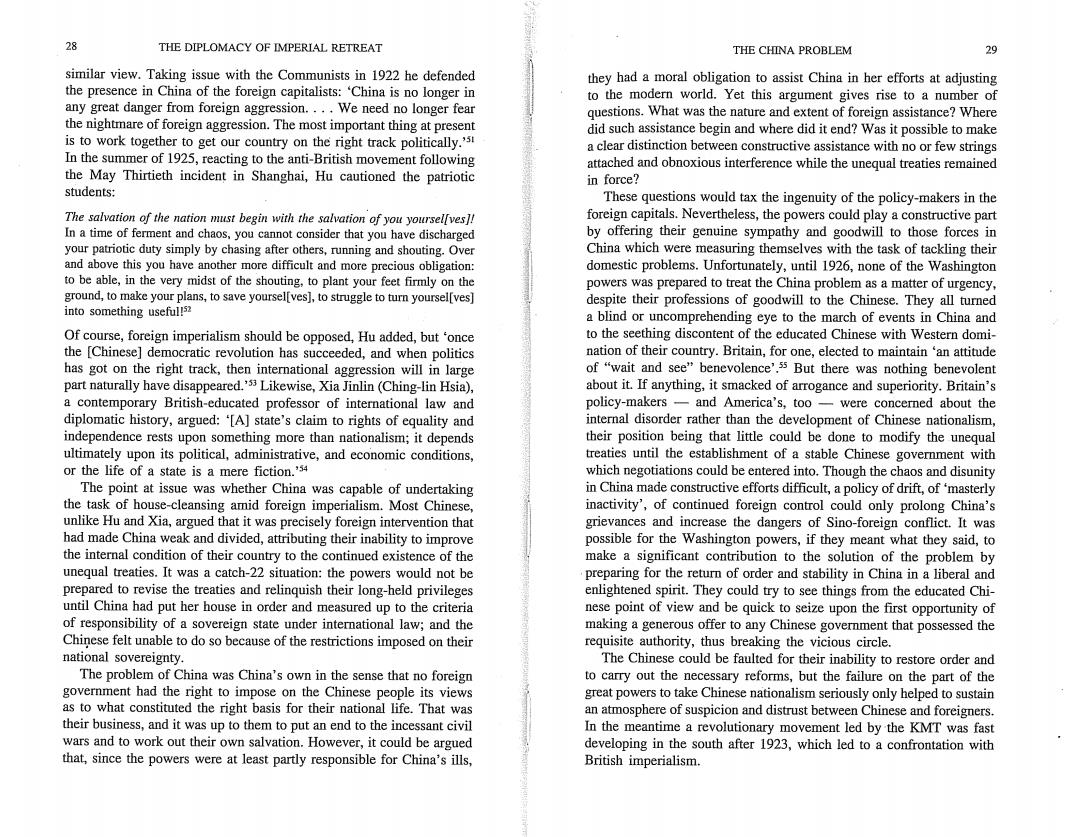
28 THE DIPLOMACY OF IMPERIAL RETREAT THE CHINA PROBLEM 29 similar view.Taking issue with the Communists in 1922 he defended they had a moral obligation to assist China in her efforts at adjusting the presence in China of the foreign capitalists:'China is no longer in to the modern world.Yet this argument gives rise to a number of any great danger from foreign aggression....We need no longer fear questions.What was the nature and extent of foreign assistance?Where the nightmare of foreign aggression.The most important thing at present did such assistance begin and where did it end?Was it possible to make is to work together to get our country on the right track politically.'s a clear distinction between constructive assistance with no or few strings In the summer of 1925,reacting to the anti-British movement following attached and obnoxious interference while the unequal treaties remained the May Thirtieth incident in Shanghai,Hu cautioned the patriotic in force? students: These questions would tax the ingenuity of the policy-makers in the The salvation of the nation must begin with the salvation of you yourselfves]! foreign capitals.Nevertheless,the powers could play a constructive part In a time of ferment and chaos,you cannot consider that you have discharged by offering their genuine sympathy and goodwill to those forces in your patriotic duty simply by chasing after others,running and shouting.Over China which were measuring themselves with the task of tackling their and above this you have another more difficult and more precious obligation: domestic problems.Unfortunately,until 1926,none of the Washington to be able,in the very midst of the shouting,to plant your feet firmly on the powers was prepared to treat the China problem as a matter of urgency, ground,to make your plans,to save yoursel[ves],to struggle to turn yoursel[ves] despite their professions of goodwill to the Chinese.They all turned into something useful!52 a blind or uncomprehending eye to the march of events in China and Of course,foreign imperialism should be opposed,Hu added,but 'once to the seething discontent of the educated Chinese with Western domi- the [Chinese]democratic revolution has succeeded,and when politics nation of their country.Britain,for one,elected to maintain 'an attitude has got on the right track,then international aggression will in large of "wait and see"benevolence'.s5 But there was nothing benevolent part naturally have disappeared.'Likewise,Xia Jinlin(Ching-lin Hsia), about it.If anything,it smacked of arrogance and superiority.Britain's a contemporary British-educated professor of international law and policy-makers-and America's,too-were concerned about the diplomatic history,argued:'[A]state's claim to rights of equality and internal disorder rather than the development of Chinese nationalism, independence rests upon something more than nationalism;it depends their position being that little could be done to modify the unequal ultimately upon its political,administrative,and economic conditions, treaties until the establishment of a stable Chinese government with or the life of a state is a mere fiction.'54 which negotiations could be entered into.Though the chaos and disunity The point at issue was whether China was capable of undertaking in China made constructive efforts difficult,a policy of drift,of 'masterly the task of house-cleansing amid foreign imperialism.Most Chinese, inactivity',of continued foreign control could only prolong China's unlike Hu and Xia,argued that it was precisely foreign intervention that grievances and increase the dangers of Sino-foreign conflict.It was had made China weak and divided,attributing their inability to improve possible for the Washington powers,if they meant what they said,to the internal condition of their country to the continued existence of the make a significant contribution to the solution of the problem by unequal treaties.It was a catch-22 situation:the powers would not be preparing for the return of order and stability in China in a liberal and prepared to revise the treaties and relinquish their long-held privileges enlightened spirit.They could try to see things from the educated Chi- until China had put her house in order and measured up to the criteria nese point of view and be quick to seize upon the first opportunity of of responsibility of a sovereign state under interational law;and the making a generous offer to any Chinese government that possessed the Chinese felt unable to do so because of the restrictions imposed on their requisite authority,thus breaking the vicious circle. national sovereignty. The Chinese could be faulted for their inability to restore order and The problem of China was China's own in the sense that no foreign to carry out the necessary reforms,but the failure on the part of the government had the right to impose on the Chinese people its views great powers to take Chinese nationalism seriously only helped to sustain as to what constituted the right basis for their national life.That was an atmosphere of suspicion and distrust between Chinese and foreigners. their business,and it was up to them to put an end to the incessant civil In the meantime a revolutionary movement led by the KMT was fast wars and to work out their own salvation.However,it could be argued developing in the south after 1923,which led to a confrontation with that,since the powers were at least partly responsible for China's ills, British imperialism
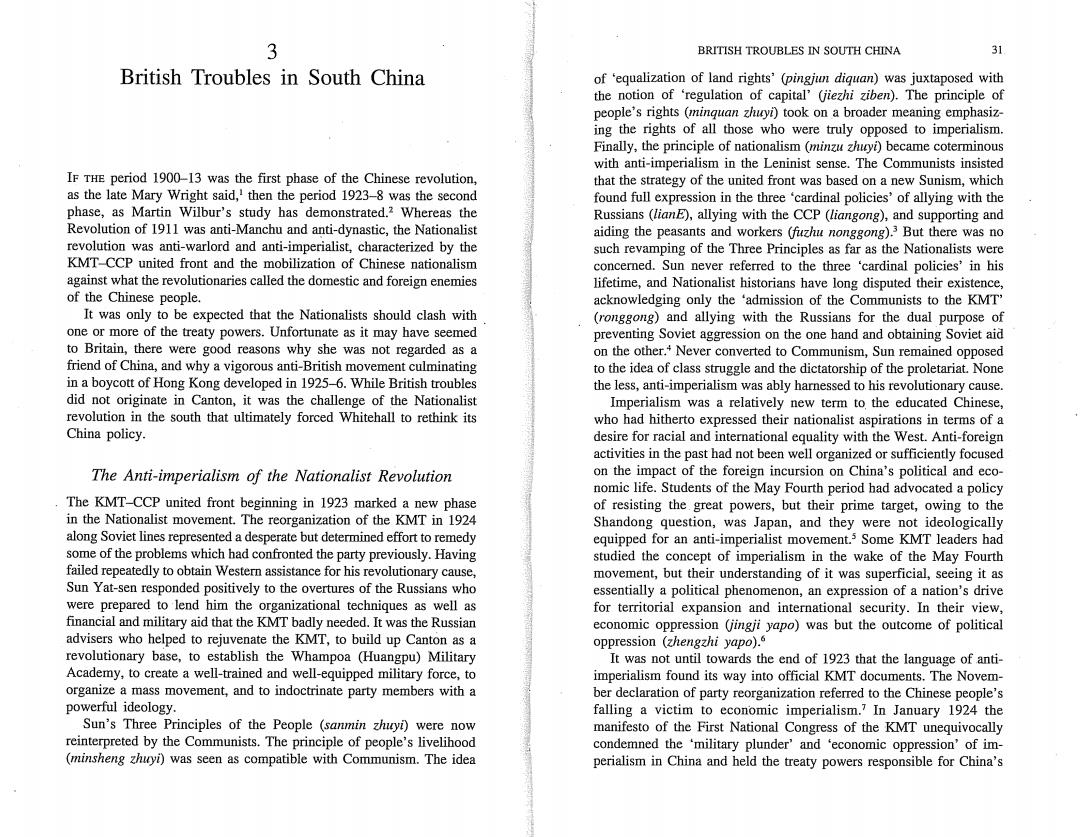
3 BRITISH TROUBLES IN SOUTH CHINA 31 British Troubles in South China of'equalization of land rights'(pingjun diquan)was juxtaposed with the notion of 'regulation of capital'(jiezhi ziben).The principle of people's rights (minquan zhuyi)took on a broader meaning emphasiz- ing the rights of all those who were truly opposed to imperialism. Finally,the principle of nationalism(minzu zhuyi)became coterminous with anti-imperialism in the Leninist sense.The Communists insisted IF THE period 1900-13 was the first phase of the Chinese revolution, that the strategy of the united front was based on a new Sunism,which as the late Mary Wright said,'then the period 1923-8 was the second found full expression in the three 'cardinal policies'of allying with the phase,as Martin Wilbur's study has demonstrated.2 Whereas the Russians(lianE),allying with the CCP(liangong),and supporting and Revolution of 1911 was anti-Manchu and anti-dynastic,the Nationalist aiding the peasants and workers (fuzhu nonggong).3 But there was no revolution was anti-warlord and anti-imperialist,characterized by the such revamping of the Three Principles as far as the Nationalists were KMT-CCP united front and the mobilization of Chinese nationalism concerned.Sun never referred to the three 'cardinal policies'in his against what the revolutionaries called the domestic and foreign enemies lifetime,and Nationalist historians have long disputed their existence, of the Chinese people. acknowledging only the 'admission of the Communists to the KMT' It was only to be expected that the Nationalists should clash with (ronggong)and allying with the Russians for the dual purpose of one or more of the treaty powers.Unfortunate as it may have seemed preventing Soviet aggression on the one hand and obtaining Soviet aid to Britain,there were good reasons why she was not regarded as a on the other.+Never converted to Communism,Sun remained opposed friend of China,and why a vigorous anti-British movement culminating to the idea of class struggle and the dictatorship of the proletariat.None in a boycott of Hong Kong developed in 1925-6.While British troubles the less,anti-imperialism was ably harnessed to his revolutionary cause. did not originate in Canton,it was the challenge of the Nationalist Imperialism was a relatively new term to.the educated Chinese, revolution in the south that ultimately forced Whitehall to rethink its who had hitherto expressed their nationalist aspirations in terms of a China policy. desire for racial and international equality with the West.Anti-foreign activities in the past had not been well organized or sufficiently focused The Anti-imperialism of the Nationalist Revolution on the impact of the foreign incursion on China's political and eco- nomic life.Students of the May Fourth period had advocated a policy The KMT-CCP united front beginning in 1923 marked a new phase of resisting the great powers,but their prime target,owing to the in the Nationalist movement.The reorganization of the KMT in 1924 Shandong question,was Japan,and they were not ideologically along Soviet lines represented a desperate but determined effort to remedy equipped for an anti-imperialist movement.3 Some KMT leaders had some of the problems which had confronted the party previously.Having studied the concept of imperialism in the wake of the May Fourth failed repeatedly to obtain Western assistance for his revolutionary cause, movement,but their understanding of it was superficial,seeing it as Sun Yat-sen responded positively to the overtures of the Russians who essentially a political phenomenon,an expression of a nation's drive were prepared to lend him the organizational techniques as well as for territorial expansion and international security.In their view, financial and military aid that the KMT badly needed.It was the Russian economic oppression (jingji yapo)was but the outcome of political advisers who helped to rejuvenate the KMT,to build up Canton as a oppression (zhengzhi yapo). revolutionary base,to establish the Whampoa(Huangpu)Military It was not until towards the end of 1923 that the language of anti- Academy,to create a well-trained and well-equipped military force,to imperialism found its way into official KMT documents.The Novem- organize a mass movement,and to indoctrinate party members with a ber declaration of party reorganization referred to the Chinese people's powerful ideology. falling a victim to economic imperialism.7 In January 1924 the Sun's Three Principles of the People (sanmin zhuyi)were now manifesto of the First National Congress of the KMT unequivocally reinterpreted by the Communists.The principle of people's livelihood condemned the 'military plunder'and 'economic oppression'of im- (minsheng zhuyi)was seen as compatible with Communism.The idea perialism in China and held the treaty powers responsible for China's